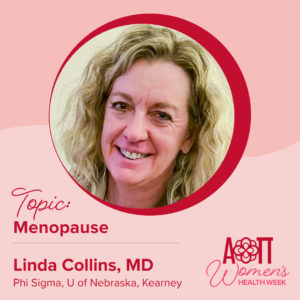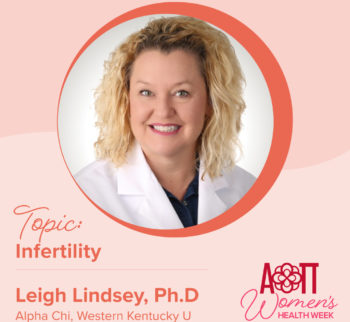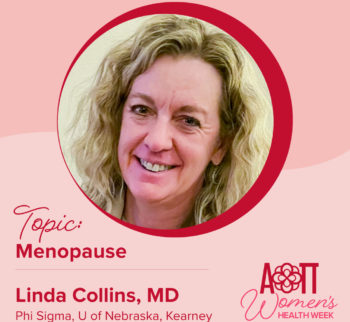Wellness Wednesday

It’s Women’s Health Wednesday & we know you have questions! So, AOII is bringing you all the answers and details from the experts in the fields of Birth Control, PCOS, Infertility, and Menopause.
A special thank you to our AOII medical providers for taking the time to help educate our membership!
Birth Control

What are the most common types of birth control that your patients use? The most common birth control is the combined oral contraceptive pill. As providers we are encouraging people, especially teens, to use LARCs. Long-acting reversible contraception such as IUS.
What are the side effects no one talks about? Oral contraceptive pills (OCP) have some positive side effects not often discussed, such as a reduction in uterine and ovarian cancer when used for 8 consecutive months or more. It is also weight positive (controls weight gain and sometimes assists in weight loss) in women with PCOS.
How do I know which birth control is best for me? Many factors determine what option of BC is right for you. I recommend a discussion with your health care provider that includes an in-depth review of your medical history and lifestyle (can you remember daily or weekly options, does you schedule often change, proximity of pharmacy that carries your desired medication). Being able to remember a pill every day at the same time is often a barrier to oral options. Women who have high blood pressure or history of migraines with aura should avoid options that have estrogen, such as a pill, patch, or ring. LARCs are good options because they have few contraindications and allow you to maintain your own hormone production, rather than suppressing the ovaries like many options do.
Are there medications that interfere with the efficacy of birth control? Some medications do interfere with oral birth control, patch, or ring. These include antiseizure meds, some antivirals for HIV, rifampicin like antibiotics, and St John’s wort. This list is not inclusive, but the most common.
How long after using birth control does it take to get pregnant?
The pill, patch, ring, and IUD are all immediately reversible when ready to conceive. Women coming off the pill are most fertile within the first 3 months off the pill. The depo provera shot can take up to 18 months for fertility to return once stopped, the reversibility of ovarian suppression is different in each person. Nexplanon (arm implant) is generally reversible within the week of removal, yet again, this can vary.
What are the long-term potential ramifications of using hormonal birth control for long periods of time? Long term use of birth control has been found safe in multiple studies. The pill, patch, and ring can decrease ovarian and uterine cancer risks. Long term use does not negatively impact fertility. IUDs should not be left in after its expiration because it may adhere to the uterine wall and cause uterine scarring with removal.
Are there non-hormonal options for birth control? IUDs are considering nonhormonal options of BC. Paragard is copper and good for 10 years; this contains no hormones and does not give any benefit to the patient’s bleeding profile. Mirena, Skyla, and Kyleena have progesterone in the body of the IUD, but this does not absorb into the blood supply. It works locally to reduce menstrual flow. Phexxi is a new nonhormonal option for birth control. It is a medication that comes in an applicator and inserted into the vagina before sex.
Can HBC mask symptoms of things like PCOS or Endometriosis? HBC does not mask signs and symptoms of PCOS and endometriosis. I prefer to think of it as treating the conditions. People with high blood pressure take medicine to control the hypertension, if they stop the meds the hypertension returns. Same with BC in regard to PCOS and endometriosis. BC can control cramps, heavy flow, irregular cycles, and many other things. BC can also preserve fertility on women with endometriosis.
What is the benefit of birth control after having children but before starting menopause? Oral contraceptive pills, patch and ring are beneficial in women before menopause because it can control the irregular bleeding, hot flashes, or mood swings associated with perimenopause. It also can provide reliable birth control if you feel your family is complete.
Infertility

What advice would you give a patient who is struggling with infertility? Be patient and be hopeful. It’s important to have realistic expectations. Infertility is more common than people realize (about 7 million couples per year seek infertility care in the US), so please know that if you are affected by this, you are not alone. Difficulty conceiving can be emotionally and financially draining on relationships. I counsel my patients that the work-up for infertility is a long process, and it takes time to get answers. Up to 20% of cases of infertility are unexplained, meaning even after having a thorough work-up, there is no explanation as to why pregnancy is not achieved. There are many treatments available, but there are no guarantees with any treatment, regardless of how much is spent on the treatment. Some treatments are very expensive and cost prohibitive for many couples, and most health insurance plans do not cover infertility treatments.
What type of treatment would you recommend trying first to increase my fertility? After a work-up in complete, treatment depends on the cause of infertility. If a cause was identified, treatment is targeted at correcting the problem. Weight loss is often recommended, as being overweight or obese can affect a woman’s ability to ovulate. A weight loss of 5-10% can increase a woman’s chance of conceiving. The most common medications prescribed are those that induce ovulation, such as Clomid or Letrozole.
If I have unexplained infertility, what diagnostic tests do you recommend? The most common tests for women for the initial work-up for infertility can be done by any OB/GYN office. The initial work-up includes blood work to check several different hormone levels. Vaginal cultures are obtained to check for infections, and a transvaginal ultrasound will be done to look at the uterus and ovaries to check for any obvious malformations or abnormal growths that may explain the inability to conceive. For men, a semen analysis is the most common test done to determine the quality and quantity of sperm, e.g., are there enough healthy sperm? More invasive testing may include an X-ray procedure called a hysterosalpingogram to look inside the uterus and fallopian tubes to look for uterine anomalies, blockages, inflammation, scarring, etc. Laparoscopic surgery may be needed to look for endometriosis, adhesions, scarring, etc.
How long do you encourage patients to wait after miscarriage to try conception again? Typically, waiting 3 months is recommended to allow hormone levels to return to normal, and to allow the uterine lining to reset.
Are there any lifestyle modifications that might help my condition and increase my chance of getting pregnant? Maintaining a healthy weight is recommended to increase chances of fertility. If underweight (BMI<19), gaining weight is recommended to get patient’s weight to ~ 100 lbs, or BMI of 19 or higher. If obese (BMI>30), weight loss of 5-10% can restore a woman’s fertility. I advise patients to make the following lifestyle modifications if they use any of the following: stop smoking tobacco or THC, vaping, using illicit drugs; reduce drinking to no more than 2-3 alcoholic beverages per week. If not already exercising regularly, engage in some form of exercise approximately 150 minutes per week. Last, eat a diet rich in nutrients and vitamins, and avoid a diet high in processed foods. I spend a lot of time with my patients educating them how to track ovulation. Knowing when ovulation occurs is equally as important as knowing when menses occurs. Also, many women are unaware that they should be engaging in unprotected intercourse during ovulation in order to achieve pregnancy. Educating women on the signs and symptoms of ovulation, as well as when to engage in unprotected intercourse, increases a woman’s chance of conceiving.
At what point would you encourage your patients to seek a specialist? Typically, patients under the age of 35 must try to achieve pregnancy every month for 12 months before being considered infertile (if >35, that time is reduced to 6 months). After 12 months, if no pregnancy is achieved, then a work-up by your OB/GYN is warranted. For my patients, I will do the work-up and give the patient 6 months’ worth of ovulation-inducing drugs (Clomid, Letrozole, etc.), as well as Metformin. If no pregnancy is achieved in those 6 months, I recommend the patient go to a fertility specialist
PCOS

What causes Polycystic Ovarian Syndrome? We do not actually know a “cause” of PCOS. In medicine, knowing the exact cause helps with a cure, but PCOS really has no cure either. Based on my medical perspective, I do believe this gynecologic metabolic disorder can be inherited. Essentially, we have environmentally and genetically encouraged this disorder to pass on. In the hunter/gatherer days, it benefited women to store glucose for abnormal lengths of time. Ovulation three times a year meant less children, and less likely to die in childbirth. These women had better survival chances and eventually had daughters, who then passed along their insulin-resistance and anovulatory bleeding patterns to their daughters. Now, unfortunately, there is the entire middle of the grocery store filled with food that is stored as fat. In modern-day life, women also like to plan their pregnancies, and anovulatory bleeding patterns are very difficult to plan around.
What are the symptoms of PCOS?
- Anovulatory Bleeding patterns (irregular length cycles, skipping periods)
- Male Pattern hair growth
- Weight gain – centripetal – around the middle, not so much in arms/legs
- Abnormal hormone levels- LH:FSH ratio more than 2:1
- Insulin resistance – elevated insulin levels
- Polycystic ovaries on ultrasound
What complications can PCOS cause? Infertility if a common complication of PCOS because the timing of intercourse with ovulation becomes very difficult. Often, ovulation induction medications are needed like Femara or Clomid to help with timing. If bleeding pattern remains irregular over a lifetime (less than a period every 3 months), a woman has increased risk of developing uterine cancer over time. This continual cycle of your body building a lining that never sheds correctly, and an overgrowth of cells in the body with incorrect turnover rate can lead to cancer.
What can I do if I have PCOS but want to get pregnant? Talk to your doctor! PCOS does not mean infertility. I have delivered many PCOS babies because patients assume they do not need protection since they have heard PCOS causes infertility. PCOS patients do ovulate – the timing can just be so difficult to predict. Your physician can assess labwork, insulin levels, possibly start Metformin to decrease insulin resistance, and start medication like Femara or Clomid to better communicate timing. Progesterone pills may even be given to promote a withdraw bleed so that that the timing of ovulation medication can be predicted along with timing of ovulation and intercourse.
What treatment options are available if I am not trying to get pregnant? Hormone methods in birth control are recommended if you are not having a period at least every 3 cycles to reduce the risk of uterine cancer in the future. Methods include progesterone-containing IUDs which keep lining thin, birth control pills, NuvaRing, patches, Depo Provera, or a Nexplanon arm implant. If I’m on birth control, what can I look out for or what tests should I have done regularly to make sure my birth control is not masking symptoms? Birth control can mask symptoms of PCOS, and that is ok! If PCOS is underlying and a pregnancy is not desired – birth control can both prevent pregnancy and regulate cycles. Upon stopping birth control, if any signs or symptoms of PCOS are noted and fertility is desired, I would encourage downloading an app, such as “Flo”, a documenting cycle timing, and even taking home ovulation predictor kit tests so that you and your physician can have a discussion about your cycles, and work toward achieving pregnancy if so desired. If you have PCOS, and you have at least a period every 3 months, no treatment is necessary. Spironolactone is a medication that can also be given to reduce male pattern hair growth, and laser/electrolysis also a treatment method.
Menopause

How do I know if I have started menopause? The transition into menopause is called perimenopause. It is usually marked by classic symptoms and irregular menstrual cycles. Menopause status is the point at which periods have ceased for a full 12 months. At this point, a woman is considered postmenopausal. The average age of menopause is 52 years old, but anywhere between 45-55 years is common.
What are the most common symptoms associated with menopause? The most common symptoms are irregular menstrual cycles in either timing or length, hot flashes/flushes (sudden feeling of heat, sweating, and possibly red blotches), night sweats, vaginal dryness that can lead to painful sexual relations, weakened bladder muscles leading to bladder leakage while coughing, sneezing, laughing, or exercising, and increased vaginal infections.
How long does the process of menopause normal take? The transition into menopause (perimenopause) can take several years. It also may occur suddenly with surgery (removal of ovaries) or with medications (usually treatments for breast cancer).
How can I work to maintain a healthy weight during and after menopause? Move more as physical activity, aerobic exercise, and strength training help to maintain muscle mass which is the key to a good metabolism. Eat less- general recommendation to eat 200 calories less than earlier in life. A plant-based or Mediterranean diet is ideal. Limit sweets including sugar sweetened drinks. Limited alcohol use. Seek support from family and friends to help you with your goals. Sleep is important as sleep deprivation is known to contribute to weight gain. Healthy weight management requires permanent changes in habits, not just a temporary “diet”.
What are the medications that I might consider to control my menopause symptoms? Hormonal treatments (estrogen and progesterone) are the most effective treatment. It is important that estrogen and progesterone be used together unless the woman has had a hysterectomy, as estrogen alone can cause uterine cancer. This can come in the form of pills, patches, creams, implants, and gels. It is generally recommended to use the lowest effective dose for the shortest time necessary, as long- term use of hormone replacement therapy has been linked with breast cancer, stroke, and heart disease. Non- hormonal meds that are FDA approved are SSRIs (a category of antidepressant) and ospemifene (for vaginal symptoms of painful sex). Non-FDA approved supplements that are commonly used are black cohosh, red clover, and soy. If I choose to use hormone therapy, what are the advantages and disadvantages of the various routes? Typically, it really is just personal preference between oral, patches, or topical. Vaginal estrogen, which is not linked to stroke, heart disease and breast cancer, can be used alone if symptoms are mostly vaginal. Bioidentical hormone replacement (which is not FDA approved) has not been proven to be safer or more effective.
Are there lifestyle or other modifications I can make to help alleviate the symptoms? Deep breathing, massage therapy, and relaxation techniques can be helpful for mood symptoms. Sleeping in lighter clothes with a fan and lower house temperatures can help sleep disturbances. Reduce acidic foods and caffeine to decrease bladder issues. Kegel (pelvic floor) exercises are important to reduce the bladder incontinence that can occur. Mind-body practices such as yoga, tai chi, and acupuncture can also be helpful.
Does menopause cause my need for annual check-ups to change? No. Annual check-ups are still important for breast cancer screening, monitoring for GYN cancers, assessment for pelvic floor disorders, and vulvar/vaginal issues.





